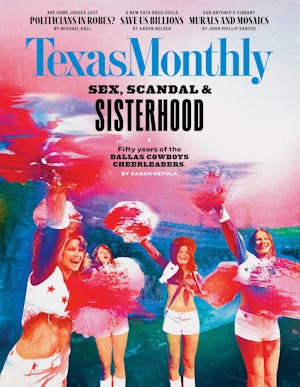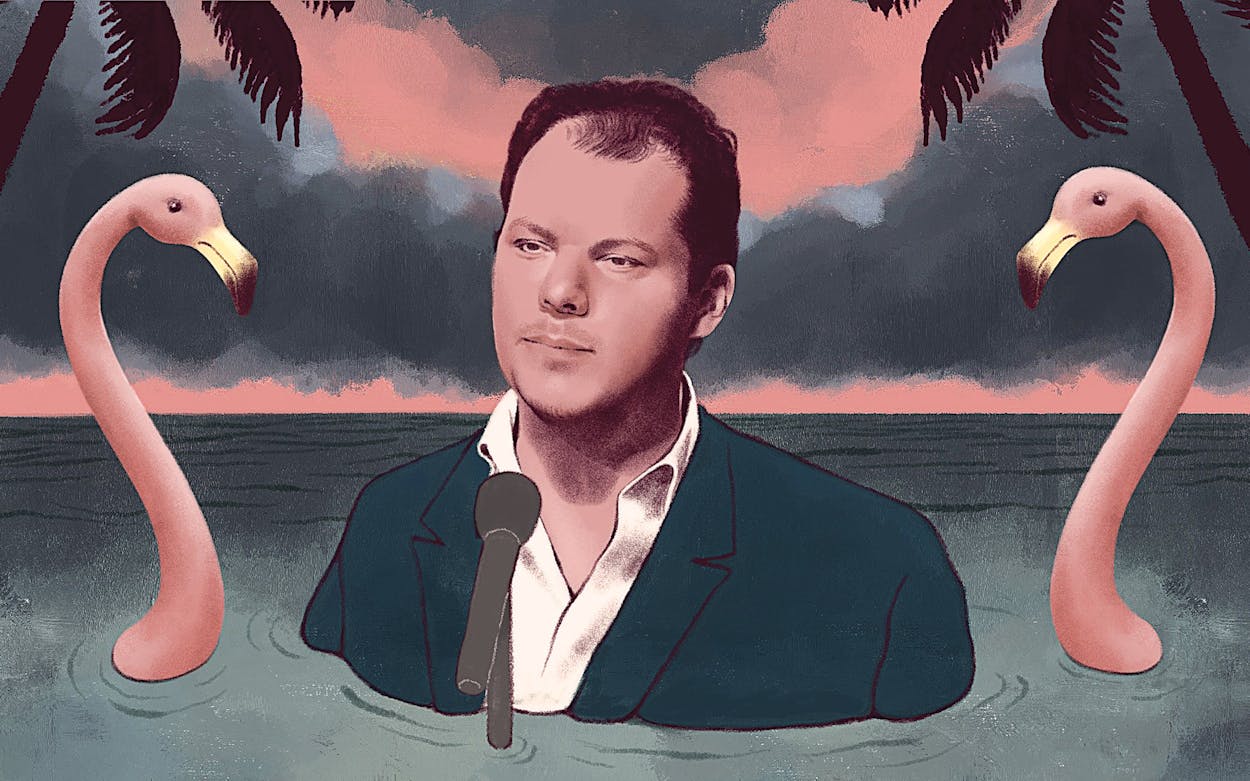Chris Geppert knew where he wanted Christopher Cross to go. In the late seventies, Geppert, front man and songwriter for the Austin four-piece band called Christopher Cross, regularly sent demos to Warner Bros. Records, a label that was renowned for turning singer-songwriters into stars. In this era, the roster at Warners included Leonard Cohen, Gordon Lightfoot, Van Morrison, Randy Newman, Bonnie Raitt, Todd Rundgren, James Taylor, and Neil Young. Geppert wanted to be in their company, literally and figuratively.
But the accomplished and opinionated executives at Warners who were charged with signing new talent didn’t return Geppert’s affections. They’d heard his music and shrugged at this Texas songwriter who didn’t sound a lick like he was from Texas. When a new Christopher Cross demo arrived at the L.A. office of Warners in mid-1978, employees rolled their eyes, except for Michael Omartian, a junior member of the staff, who especially liked “Sailing” and “Ride Like the Wind.” “It wasn’t what Warners considered cool,” he told me. “But I thought Chris was a great pop writer.”
At the weekly Wednesday morning meeting, his enthusiasm for Cross puzzled his bosses—Warners had already moved into new wave and punk rock, anticipating a new decade—but they allowed him to sign the band and produce its album. It’s your funeral, Omartian.
The other three members of Christopher Cross—bassist Andy Salmon, drummer Tommy Taylor, and keyboardist Rob Meurer, who’d known Geppert since they were teenagers growing up in San Antonio—weren’t great musicians, Omartian thought. But because he knew so many top session aces in L.A., he was confident he could spackle any cracks in the music. Now it was Geppert who didn’t reciprocate the enthusiasm. He hoped to work with one of the bigger talent developers at Warners: Ted Templeman, who’d produced Van Morrison but was now busy with Van Halen’s second album, or Russ Titelman, who signed and produced Randy Newman and James Taylor and was now working with George Harrison. Geppert gave Omartian the cold shoulder until he found out his champion had played keyboards on several records by Steely Dan, the singer’s favorite band.
Making the album was an ordeal. Omartian reportedly spent seven hundred hours in the studio with the band and a succession of big-name guests, from stars like Michael McDonald and Don Henley to triple-scale ringers Larry Carlton and Jay Graydon. But almost as soon as it was released in December 1979, Christopher Cross was a boffo smash. The album, sporting a regal-looking flamingo on its cover, sold five million copies. “Ride Like the Wind” and “Sailing” were massive hits, and at the Grammy Awards in February 1981, Cross became the first artist to win Best New Artist and Album, Record, and Song of the Year in one night. He accepted his Grammys unaccompanied by his bandmates. Christopher Cross was no longer known as the name of a group.
The lyrics to “Ride Like the Wind,” which Cross wrote while on LSD, presage some of Bon Jovi’s cornier western-gunman fantasias. But the stately ballad “Sailing” is the song that’s taken hold in pop culture and hung around, leading to Cross jokes on 30 Rock, Cobra Kai, Family Guy, Futurama, and Seinfeld. The song’s breezy nautical imagery helped inspire writer J.D. Ryznar to invent the term “yacht rock” to describe smooth pop songs from the seventies and eighties, when normcore ruled the Top 40.
“The beauty of the song is that it resonates with so many people,” Cross told me in a statement. Although he declined to do a full interview, he did send an email addressing some of my questions. “It can be interpreted as simply being in a boat on the water or as complex as the transition we experience through art. I have been very touched by the way people relate to the song.”
But the origins of “Sailing” couldn’t be much further from its beatific sound. Yacht rock is often described as escapist, and in this case that’s true in a way it isn’t for, say, “Still the One” or “Lido Shuffle.” In a very personal way, “Sailing” is about escaping tumult, about imagining and achieving hard-earned peace while living in the thick of misery.
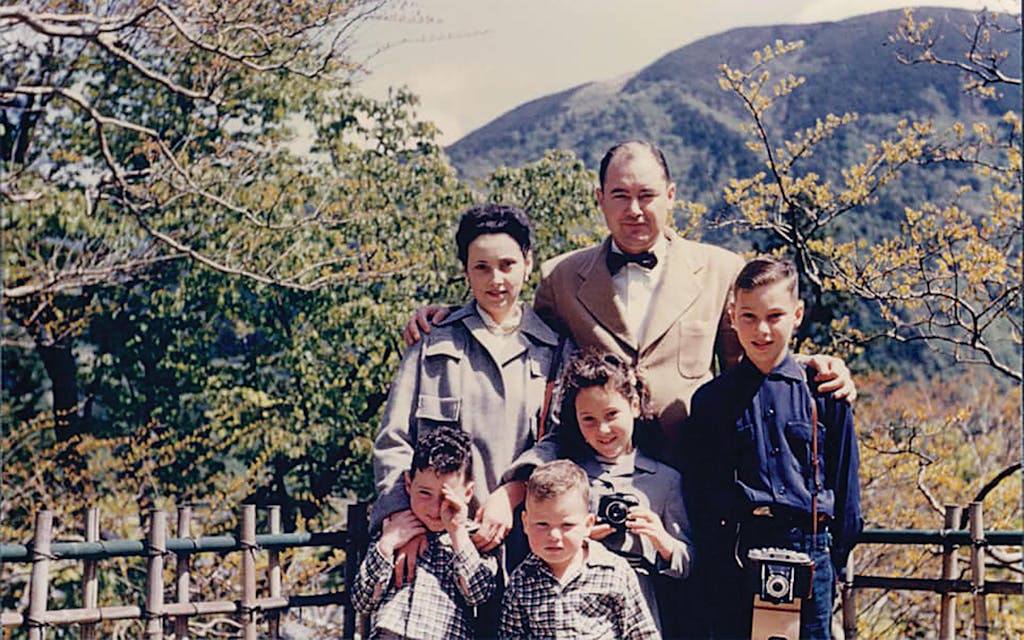
Cross didn’t have a good childhood, he’s said. His father, Leo J. Geppert, was an Army doctor who reached the rank of colonel while serving in World War II, the Korean War, and the Vietnam War. After his service, he became chairman of pediatrics at the Children’s Hospital of San Antonio. Dr. Geppert was celebrated and respected, but in an interview with Howard Stern, Cross acknowledged that his father was also an alcoholic. He’s discussed it with close friends too. “Chris talked to me about how tough his dad was, a military guy and the whole bit. You could tell that whatever happened, it wasn’t good,” says Omartian, who produced three more Cross albums after the debut.
“Living in my parents’ house could be tough,” Cross, who is 71, told me. “But not from any abuse.” In fact, Cross said, it was his father who turned him on to music. “He had played bass in college and said those were the best times of his life.” Cross remembers how his dad at home would have a few drinks, put on a jazz album, and play along with it. “I saw how the music brought light into his darkness.” Cross also found relief in his friendship with a musician named Al Glasscock, a surrogate older brother who owned a small Sunfish sailboat and took him out on Canyon Lake, northeast of San Antonio.
“Sailing” has an unusual structure—there’s an orchestral intro, a leisurely arpeggiated instrumental section, two verses before the chorus appears, and three chord changes in the bridge—and if you’re not paying close attention, you might miss the significance of the pronouns. “Oh, the canvas can do miracles/Just you wait and see/Believe me,” Cross sings in a high, slightly stoic tenor. He’s imagining himself as an older man addressing the younger version of himself and offering comfort. Art and music will save you, one Cross promises the other.
For a number of reasons, though, his success was bittersweet. When he was in his early twenties, Cross married an eighteen-year-old whom he’d known for only two weeks., Roseanne Harrison, whom he’d known for only two weeks. They had a child, but their marriage ended not long after “Sailing.” “The divorce cost me dearly,” Cross later said. “I lost a good deal of money.” He told Howard Stern that because Texas is a community property state, his wife owned 50 percent of the income from his first album, in perpetuity.
“I could tell he was in pain,” Omartian said. During breaks from recording, he recalled, Cross “told me some of the things he grew up with and what kind of things it developed in him, which was his OCD.” Cross’s obsessive-compulsive disorder was evident to Omartian in the studio. “Everything had to be perfect,” the producer said. Cross acknowledged he was demanding. “My desire to make the record sound like Steely Dan probably drove Omartian crazy, but the end result was a much better record,” he said.
Over the years, Cross phased out his three bandmates, until he’d replaced all of them. In a 1995 interview with Mary Campbell of the Associated Press, Cross said there were “character tests” he’d failed, some of which “haunt me,” including not bringing his bandmates to the Grammys.
Furthermore, nearly every article written about Cross at the peak of his stardom mentioned his weight. Rolling Stone called him stocky, UPI termed him rotund, and the Santa Cruz Sentinel described him as chubby, as well as “no Robert Redford when it comes to looks.”
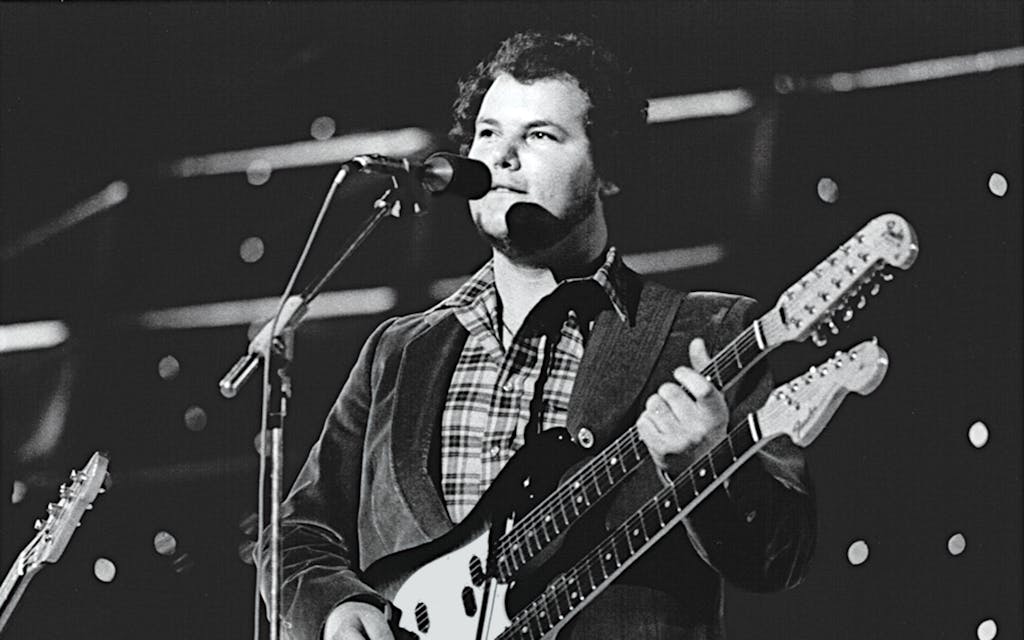
Shortly after Cross debuted, looks became more important in pop stardom, thanks to the launch of MTV, in 1981. Jeff Ayeroff, the head of creative marketing at Warner Bros., hired director David Fincher, who would go on to an illustrious Hollywood career (Fight Club, Seven), to helm Cross’s “Charm the Snake” video, which featured Cross driving a Formula race car. His face was covered by his racing helmet for the entire video. “Christopher Cross was a perfect example of ‘video killed the radio star,’ ” Ayeroff told me for my 2011 book I Want My MTV.
Cross won an Academy Award for “Arthur’s Theme (Best That You Can Do),” the 1981 number one pop hit he wrote with Burt Bacharach, Carole Bayer Sager, and Peter Allen. But pretty soon, the hits stopped. “I guess I got all my Christmas presents in one Christmas,” he said glumly to a Rolling Stone reporter, as his second album was fizzling out.
His frustration and disillusionment grew so large that he put his Grammys in a box and hid them in a closet—“because I hate them,” he told the AP. They were symbols of a better time that only reminded him of how short-lived the better time was. “All the good he experienced was equaled by negative stuff,” Omartian observes. “I think his expectation was that [fame] would change everything that happened before, and then he’d be okay. It didn’t.”
I’d never thought about where Cross was from; if you’d asked me, I’d have guessed Annapolis, Maryland, or maybe Boulder, Colorado. When I found out he was from San Antonio, I started thinking of “Sailing” as the least-Texas song that’s ever come out of Texas. But what do I know? I’m from Connecticut.
So I called Tyler Mahan Coe, host of the invaluable country music podcast Cocaine & Rhinestones, who has more than once tweeted about his love for the first Christopher Cross album. Coe recalls, in precise detail, the time he was on tour with his father, the tempestuous country star David Allan Coe, and wandered alone into a stereo store in San Juan Capistrano, south of Los Angeles. The salesman, eager to show off a pair of speakers, put on the second side of Christopher Cross. Coe bought the turntable and the speakers, and the salesman threw in a copy of the album.
“He’s a sincere, heart-on-his-sleeve guy. And he doesn’t care if you think he’s cool or not,” says Coe. He appreciates the untainted sincerity of Cross’s commitment to the longing and loss in his lyrics. “I think it’s fairly obvious that he has heard a shitload of country music,” Coe replies. “I don’t think his lyrics would be this good without him growing up in Texas. He was in a cover band in the mid-seventies, which means Willie Nelson, Waylon Jennings, and the outlaw movement were for sure on his map.
Dallas mayor Eric Johnson discovered Cross’s music during the pandemic, and in a tweet, he crowned himself “the first Yacht Rock certified mayor on the planet.”
“There’s a cliché that a pop song may be about being sad but a country song will be about why the person singing is sad. That’s what Christopher Cross’s songs do that not a lot of rock songs do.”
Dallas mayor Eric Johnson discovered Cross’s music during the pandemic, and in a tweet, he crowned himself “the first Yacht Rock certified mayor on the planet.” Johnson, who’s 46, told me, “For people my age, it’s the music we associate with riding around in the back seats of our parents’ cars. It’s warm and comforting.” Johnson even played yacht rock for the Dallas City Council and recalled that “it calmed them down.”
Yacht rock, and Christopher Cross’s music in particular, does have a placating effect, which is one reason it’s so widely derided. But beneath the unrippled studio sheen, “Sailing” is an act of desperation, a singer’s attempt to will himself into a safe haven, far from misery and the peril of home life.
Ever since the first caveperson screamed “GLOCKEN ZAZZA OBBO!” (I’m approximating) to warn another caveperson of a nearby saber-toothed cat, our unevolved amygdalas have associated volume with urgency and emotion. Drill sergeants and smoke alarms use decibels to get their points across. When Ozzy Osbourne sang, “I’m going off the rails on a crazy train,” it was believable, because the volume knobs were turned up to eleven. Rock music is full of musicians who act out in public, maybe because they lack the self-control to contain their torment, or maybe because they realize it’s healthier to roar at the world that plagues you.
The singer-songwriter movement of the seventies, which Christopher Cross admired so much, is often characterized as “mellow,” but that’s a superficial description. Whether it’s James Taylor singing about being institutionalized, Jackson Browne ruminating on his wife’s suicide, or Joni Mitchell mourning the daughter she gave up for adoption, soft rockers often exist in a world of internalized torment, with pain so severe that, paradoxically, they can only murmur it to us. The crazy train has a quiet car.
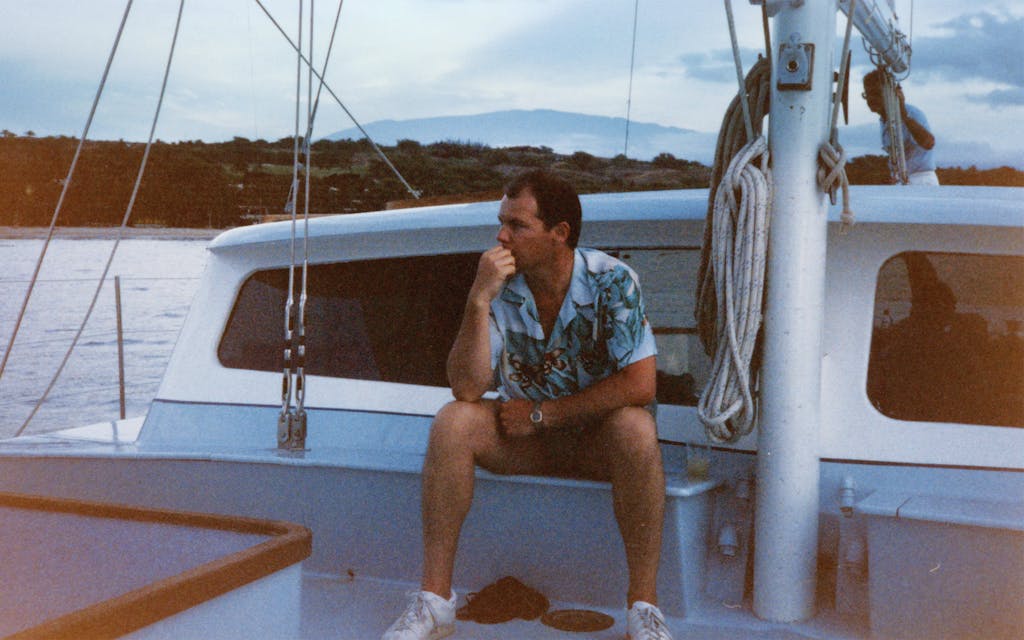
Cross moved back to Austin from L.A. in late 2011, and he wasn’t much in the news again until 2019, when he received a Hall of Fame award from the Texas Heritage Songwriters Association. In January 2020 Billie Eilish became the first artist to repeat Cross’s sweep of the four general categories at the Grammys. That March, while performing in Mexico City, he contracted COVID-19, and soon he also developed Guillain-Barré syndrome, a nervous system disorder, that caused temporary paralysis in his face, hands, and legs. He spent three weeks in an intensive care unit and five months in a wheelchair, which, among other things, caused him to delay a tour timed to the fortieth anniversary of his debut album. Through his website, he released The Complete Works, a $400 box set, and by last September he had recovered enough to start his anniversary tour, which concluded at the Paramount Theatre in Austin. As of this writing, he’s back on the road through October with performances in Austin, Fort Worth, and Houston.
In an unusually candid 1995 interview with the Orlando Sentinel, Cross paraphrased Kinky Friedman’s wisecrack about the short distance between the limousine and the gutter. “My fall from grace was traumatizing, very hard to deal with, and very disappointing and disillusioning,” he said. “Success is like money—it’s much harder to have it and then not have than never to have it at all.”
Today the singer has a different perspective on his career. His Grammys are out of the box and prominently displayed in his Central Austin home, and he says he is “very proud of and humbled by my peers’ votes” in 1981. Seven years after accepting those statues by himself, Cross reconnected with his former bandmate and childhood buddy Rob Meurer. They became good friends again, and Cross considered him his closest collaborator. They wrote more than forty songs together until Meurer’s death in a 2016 hit-and-run in L.A.
“Sailing” isn’t just Cross’s signature song. It feels like a key to decrypting the challenges, disappointments, and trauma in his life. The promise an older Cross made to himself in the lyrics—if you stick with music, you’ll escape your father’s home, escape Austin’s cover bars, escape your unhappiness—proved to be only partially true. Lots of people who feel like outcasts and devote themselves to a performing career later discover that money and fame can’t resolve the issues they’ve carried since childhood. But unlike them, Cross wrote a famous song about how art would perform a miracle for him—which, of course, it couldn’t.
This article appeared in the September 2022 issue of Texas Monthly with the headline “Rough Waters.” It originally published online on June 9, 2022, and has since been updated. Subscribe today.
- More About:
- Music
- San Antonio
- Dallas
- Austin
